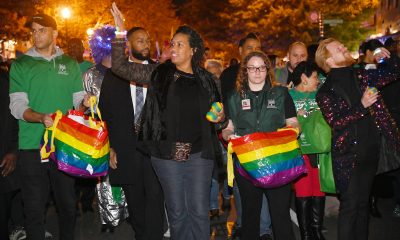Books
Washington Blade editor tells all in new book
Kevin Naff revisits 20 years in the battle for LGBTQ equality in tome that is part history lesson, part celebrity dish
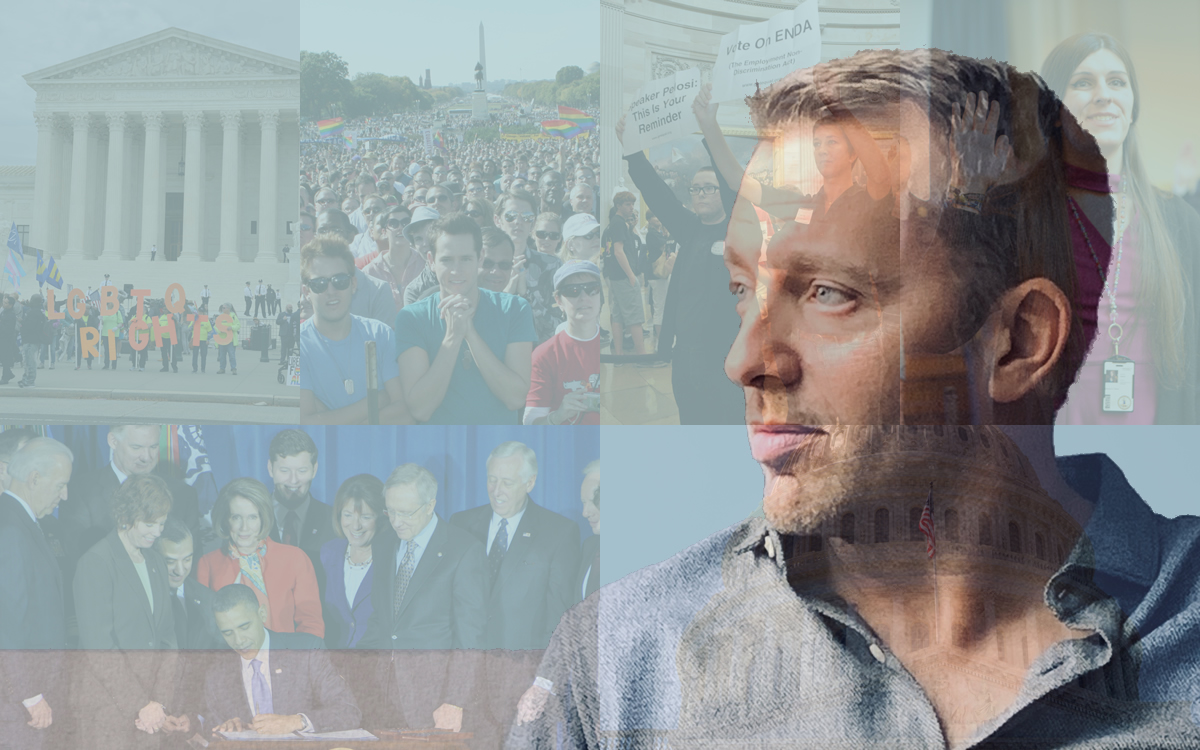
Washington Blade Editor Kevin Naff this week published his first book, “How We Won the War for LGBTQ Equality — And How Our Enemies Could Take It All Away.”
The book commemorates Naff’s 20 years editing the Blade and features two decades of his work updated with new insights and commentary, touching on everything from the fight for marriage equality and repeal of “Don’t Ask, Don’t Tell” to celebrity encounters and the outing of public figures.
It’s part history lesson and part celebrity dish, available now at Amazon.com and kevinnaff.com.
The following is adapted from an interview between Rob Watson of Rated LGBT Radio and Naff. To listen to the full interview, visit blogtalkradio.com/ratedlgbtradio.
The two-decades long war in Afghanistan was the longest in U.S. history. Wars for civil rights have been much longer, and for many, nowhere near over. Ours for LGBTQ rights is a prime example.
While gains in our particular war have been many, and by historical standards, have come incredibly fast, they have now been fought by several generations.
Author and Washington Blade editor Kevin Naff highlights this perspective in his new book “How We Won the War for LGBTQ Equality.”
“Two decades represents a mere blip in the arc of a civil rights struggle, yet in that span, the LGBTQ community in the United States went from legally second-class status to enjoying near full protection of federal law along with widespread societal acceptance and even full marriage rights,” Naff writes.
He is aware that this look into our collective history represents a glimpse into a broader, and more painful fight, where many LGBTQ families lost their fights. “Not a week has gone by in my 20 years at the Blade that I didn’t think of the generation of gay men before me who didn’t live to see all of this progress,” he writes. “They inspire me. I do this work for them. They did not die in vain. Not just the men who died, but the lesbians who cared for them when no one else would. They are not forgotten.”
“This is not a dry history lesson type of book, but if you want to learn, the book does tell the marriage equality battle, ‘Don’t Ask Don’t Tell,’ and how a lot of our wins unfolded,” Naff declared when he sat down with me on the Rated LGBT Radio podcast.
He’s right. “How to Win” shares many of Naff’s articles written as events were unfolding. Absorbing these as a modern reader, I found my deep desire to fight against anything less than full equality, and repression against our abilities to self-actualize, getting hungrier and hungrier.
For those wanting “shade and the truth,” this book delivers, as it’s filled with page-turning anecdotes to keep you glued and voracious right to the very end.
Like many of us, Naff was persecuted for being perceived as gay when he was a kid. “The walk home from school was particularly terrifying — I walked alone and my tormentors would often follow, hurling rocks and anti-gay slurs. Sometimes the fear was so intense that I would feign sick just to avoid a day of the torture,” he writes. His youth was not a time when there was much sympathy, or help, for LGBTQ children. It was the time of do-it-yourself. “There was the day I finally snapped, in seventh grade, while being taunted by a kid in gym class. The insults and threats became too much and all the anger rushed out of me…I defended myself. And it felt good,” Naff reveals. He acknowledges that his bullies “forced me to cultivate an inner strength.”
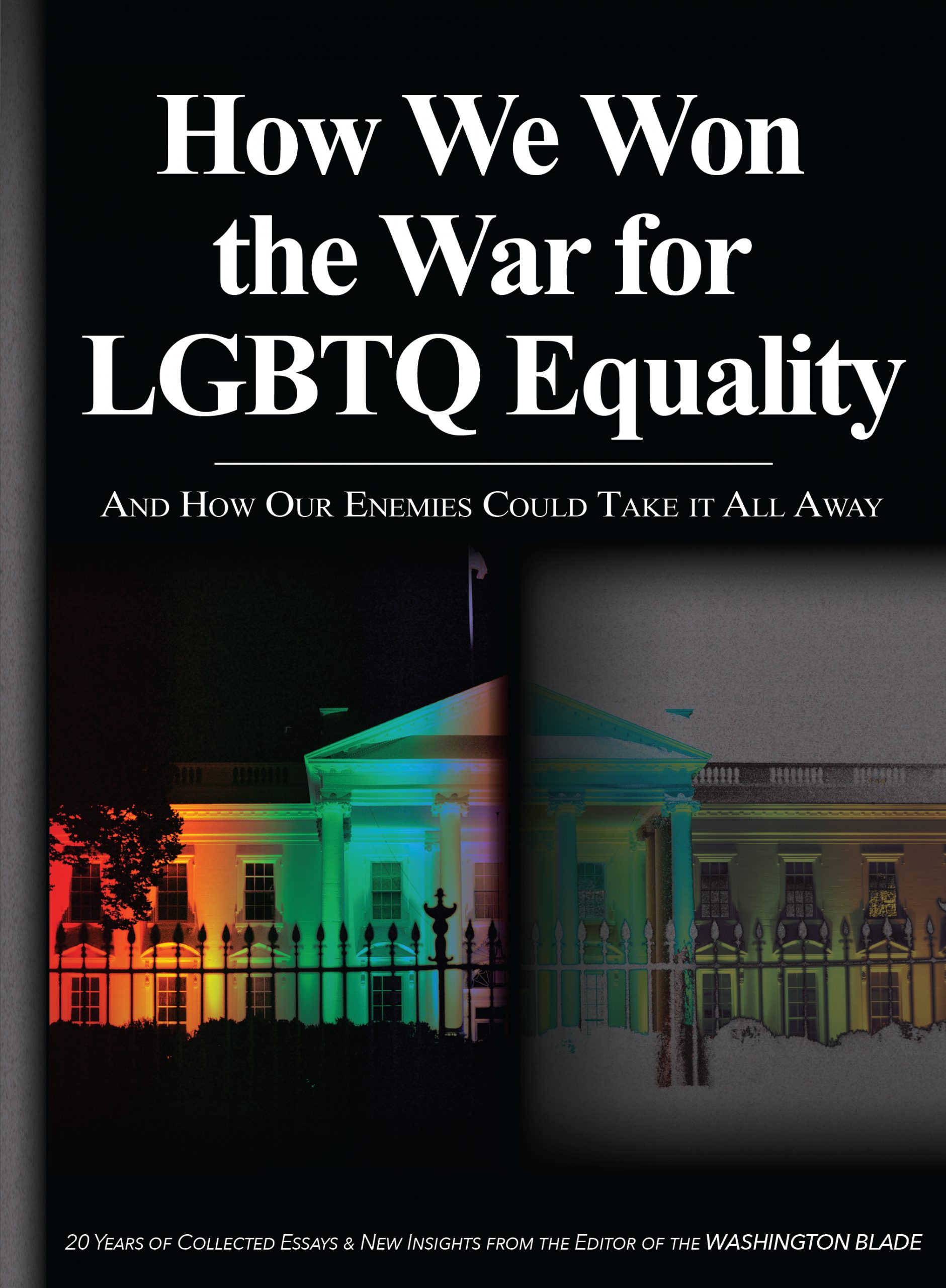
Years later, as a journalist and conscience for public progressives, Naff’s unwillingness to back down, and passion to stand and fight, emerge time and time again in the book.
While he writes of contempt for George W. Bush’s opportunistic use of same-sex marriage as a campaign wedge issue, Naff stepped up his fight to the next level when facing Maryland Gov. Martin O’Malley. O’Malley was a progressive who used LGBTQ goodwill and campaign muscle to get elected. When an appeals court rejected same-sex marriage, O’Malley went from champion to cad at light speed. He issued an offensive statement about Catholic sacraments and asserted his opposition to marriage equality.
So, Naff outed the governor’s brother, Patrick. (That the brother was gay was a fact commonly known in social circles, but had not reached the media level previously).
The governor was mad, but Naff landed a one-on-one interview with O’Malley, and eventually a path to the governor flipping support on the issue.
Naff’s unwillingness to allow LGBTQ people to be pushed around is not just with public figures who use us and then abandon us, people he calls “duplicitous allies,” but he feels no hesitancy in confronting Hollywood icons and their cults, as John Travolta found out.
Naff went viral with a piece in 2007 when he wrote a blog post criticizing the casting of a potentially closeted and indoctrinated Scientologist John Travolta, as the Divine-inspired drag role in John Waters’ musical version of “Hairspray.”
That post “generated the most attention and traffic of anything I’ve written,” Naff says. “My blog post encouraged gay fans to boycott the new film because its star, John Travolta, was Scientology’s No. 2 spokesperson and his cult was known to engage in reparative therapy, the debunked practice of changing one’s sexual orientation.”
Mainstream gossip media declared that “the gays were boycotting Hairspray.” Soon Naff found himself inundated with death threats, and being summoned by both Fox News and the Church of Scientology itself.
Naff agreed to a face off with Fox’s Bill O’Reilly whose friendly off-air persona turned rabid in front of the cameras. When Naff pointed out that he was comparing gay people to drug addicts, O’Reilly snarled, “Don’t be a wise guy, Mr. Naff.”
Naff’s biggest sin, according to the Church of Scientology, was referring to it as a “cult.” To prove that they weren’t, the president of the D.C. church invited Naff for a meeting. Upon arrival at the Scientology mansion in Dupont Circle, the church president gave Naff a tour, which included an “immaculate first-floor formal office.” After inquiring whose office it was, Naff was told that it was “Mr. Hubbard’s office” and that every church location had one. Scientology founder L. Ron Hubbard had been dead for 21 years at that point.
“Cult!” Naff and I exclaimed in unison as he told me the story.
As editor of the Washington Blade, Naff is an established invitee to the journalistic event of each season: The White House Correspondents’ Association Dinner. He writes about his dates he has taken each year from the heavenly (Judith Light) to the disastrous (Kathy Griffin). The latter made a point to scream expletives at Trump administration officials in attendance.
While Naff could appreciate the sentiment, Griffin left D.C. the next day, while he, the in-town professional, had to face all of her targets.
Laverne Cox was also a standout date. She accompanied Naff the night after Caitlyn Jenner’s televised coming out interview aired. “If one more reporter asks me about fucking Caitlyn Jenner, I’m going to lose it,” Naff reports Cox confiding. His story about Laverne Cox was not so much about Jenner, however, but reads like something out of “Oceans 8.”
Unlike the movie, Naff’s evening did not feature a planned jewel heist, nor were Sandra Bullock and Cate Blanchett anywhere in sight, but it did feature a pricey borrowed diamond bracelet that went missing off of Cox’s wrist. She feared the jeweler would accuse her of theft. The dilemma ultimately had one of the most famous transgender actresses of all time, and the editor of the nation’s oldest LGBTQ publication frantically crawling under banquet tables surrounded by the Washington elite and press corps.
Cox finally found the bauble at 4 a.m., deep at the bottom of her purse.
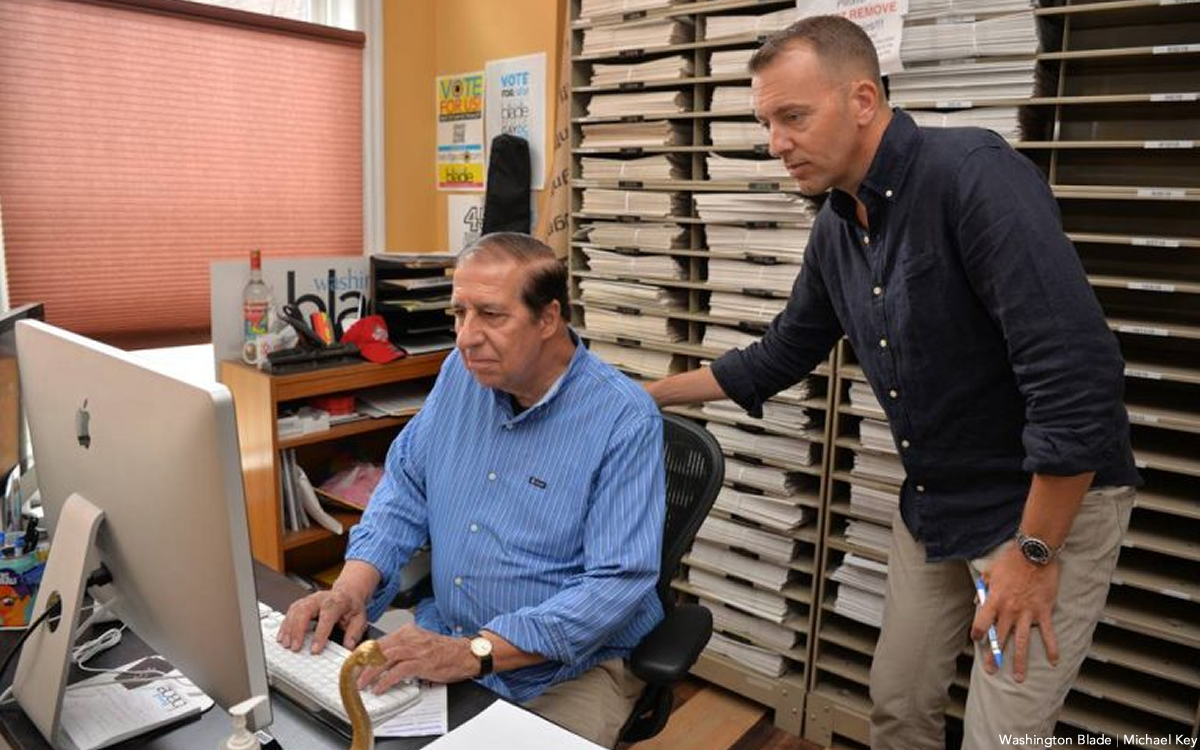
“How We Won” covers the arc of LGBTQ history over two crucial decades and hits on topics from bullying of youth, the “ex-gay” movement, the military, religion, police, and, of course, marriage equality. Besides his adventures with cults chasing him down, A-lister dates and angry governors, Naff also shares poignant emotional moments of his own.
One came in shocking fashion when he arrived to the Washington Blade offices one morning to find two men from the Blade’s then-parent company. They were there to shut the place down after a Chapter 7 bankruptcy filing.
Naff retreated to his office, scrambling to think out the next move. The Blade staff resolved to not give up and successfully put out a slim newssheet for a few months until they could recover the Blade’s assets from the bankruptcy court and keep the legacy alive.
One of the great ironies of the LGBTQ movement is that many people who have fought for progress are not the ones who live to enjoy all the gains. They win the battles but leave the new world for others to fully enjoy.
Naff is one of those pioneers. After an adult life fighting for LGBTQ people to exercise the right to marry our loves in a fully public, accepting way, challenging all who might deny a same-sex couple service, Naff had a life-changing revelation that made him choose to walk away from a huge wedding event for himself.
Months before his own wedding, he was in a serious automobile accident. He called his fiancé and pitched the idea of a small ceremony on the beach, followed by a gay cruise together around Asia. “Something happens when you are faced with a life-or-death kind of moment. It changes what’s important. It changes your perspective,” he tells me.
Naff started out his writing career as a 10-year-old writing to the Washington Post as a pissed-off Baltimore Orioles fan protesting the Major League Baseball strike of 1981. “I am STILL a pissed off Baltimore Orioles fan,” he says. From day one, he found his knack for observation and his gift for pointed communication. Those are the same qualities he brings to his participation in, and presentation of, our LGBTQ historic trek to equality victory.
In “How We Won,” he tells an unvarnished story, as he saw it, as he wrote about it, and continues to tell it, at the helm of the Washington Blade. He tells of the right-wing figures he confronted and continues to confront. He thinks of the term “outing” as an archaic term. Today, it is simply “truth-telling” of those in the public eye. As much as the title of his book implies a “win” and completion, I am confident that the 10-year-old pissed-off Baltimore Orioles fan within is not done.
Naff’s subtitle, after all, is “And How Our Enemies Could Take it All Away.”
A post-war recap for Kevin Naff might have been best expressed by the fictional Mr. Incredible when he said, “No matter how many times you save the world, it always manages to get back in jeopardy again. Sometimes I just want it to stay saved!”
As homophobic, transphobic Republican legislation sweeps the country, it is clear, we are not done and a new chapter in the war has begun. At the end of “The Incredibles,” continuing the allegory, after a family of progressives have saved the world, a huge noisy crew disrupts it (symbolic of the MAGA wave). Out pops the Under-Miner who declares, “Behold, The Under-Miner! I am always beneath you, but NOTHING is beneath me! (As it seems so for the GOP.) I hereby declare war on peace and happiness! Soon all will tremble before me!”
The music swells, and the family of authentic-selves look at each other with a smirk, opening their shirts to reveal that they are Incredibles. They know that this time, like last time, they will not be defeated.
So stands Kevin Naff, looking back and looking forward, with his band of Incredibles, LGBTQ journalists worldwide, and the rest of us, ready to fight the fight again.
As we prepare for the new battles ahead, the principles of “How We Won” will be our tools for ultimate victory: be visible, be assertive, confront lies and injustice, reinvent, rebirth and in the end, hold our personal loves sacred.
Kevin Naff and Mr. Incredible would stand for nothing less. Neither should you.
‘The Cost of Fear’
By Meg Stone
c.2025, Beacon Press
$26.95/232 pages
The footsteps fell behind you, keeping pace.
They were loud as an airplane, a few decibels below the beat of your heart. Yes, someone was following you, and you shouldn’t have let it happen. You’re no dummy. You’re no wimp. Read the new book, “The Cost of Fear” by Meg Stone, and you’re no statistic. Ask around.

Query young women, older women, grandmothers, and teenagers. Ask gay men, lesbians, and trans individuals, and chances are that every one of them has a story of being scared of another person in a public place. Scared – or worse.
Says author Meg Stone, nearly half of the women in a recent survey reported having “experienced… unwanted sexual contact” of some sort. Almost a quarter of the men surveyed said the same. Nearly 30 percent of men in another survey admitted to having “perpetrated some form of sexual assault.”
We focus on these statistics, says Stone, but we advise ineffectual safety measures.
“Victim blame is rampant,” she says, and women and LGBTQ individuals are taught avoidance methods that may not work. If someone’s in the “early stages of their careers,” perpetrators may still hold all the cards through threats and career blackmail. Stone cites cases in which someone who was assaulted reported the crime, but police dropped the ball. Old tropes still exist and repeating or relying on them may be downright dangerous.
As a result of such ineffectiveness, fear keeps frightened individuals from normal activities, leaving the house, shopping, going out with friends for an evening.
So how can you stay safe?
Says Stone, learn how to fight back by using your whole body, not just your hands. Be willing to record what’s happening. Don’t abandon your activism, she says; in fact, join a group that helps give people tools to protect themselves. Learn the right way to stand up for someone who’s uncomfortable or endangered. Remember that you can’t be blamed for another person’s bad behavior, and it shouldn’t mean you can’t react.
If you pick up “The Cost of Fear,” hoping to learn ways to protect yourself, there are two things to keep in mind.
First, though most of this book is written for women, it doesn’t take much of a leap to see how its advice could translate to any other world. Author Stone, in fact, includes people of all ages, genders, and all races in her case studies and lessons, and she clearly explains a bit of what she teaches in her classes. That width is helpful, and welcome.
Secondly, she asks readers to do something potentially controversial: she requests changes in sentencing laws for certain former and rehabilitated abusers, particularly for offenders who were teens when sentenced. Stone lays out her reasoning and begs for understanding; still, some readers may be resistant and some may be triggered.
Keep that in mind, and “The Cost of Fear” is a great book for a young adult or anyone who needs to increase alertness, adopt careful practices, and stay safe. Take steps to have it soon.
The Blade may receive commissions from qualifying purchases made via this post.
Books
‘Hurt Capital’ chronicles young life of bipolar, trans writer
New book from Isaac Amend a rich and complicated tale
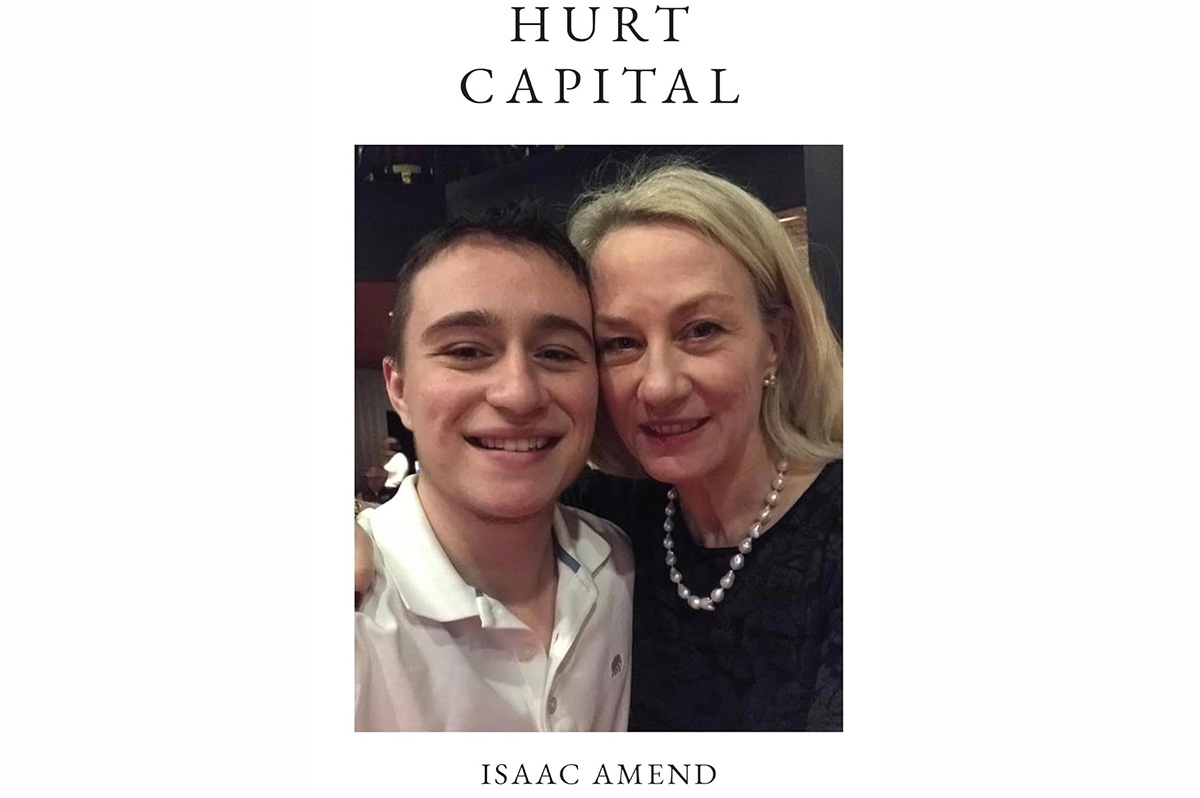
Washington Blade contributor Isaac Amend has published a new book, “Hurt Capital,” chronicling a range of topics related to his transgender status, a personal struggle following a psychotic breakdown, and more.

BLADE: Why did you write this book and why now?
ISAAC AMEND: In college, I was an avid writer for the Yale Daily News, and tried to prepare myself for a good writing career, taking classes with Pulitzer Prize-winner Michael Cunningham, and other notable authors, including Anne Fadiman and Cynthia Zarin. But when I got out of college, I spent six or seven years in the real world, outside of Ivy gates, racking up experiences to write about — whether it was falling in love with a woman, getting hit by a car in Cyprus, or being manic for 13 months straight. But once all of those things were done, I went back to my literary roots, frantically scribbling books and articles in my room at night. Now I want to have some sort of writing career, and I can partly thank the Blade for that, as you welcome most of my op-eds.
I felt like it was important to write about bipolar disorder in very honest and raw terms. I experienced a psychotic break from reality when I was 19 years old that I felt ashamed to tell everyone in my life about, but now I want to come clean with it. Recovering from a psychotic break is a complicated process, and I’ll never really know if my mind has fully recovered, but I do know that because of my break from reality, I’m able to tackle difficult problems in life without getting scared. I feel like it’s also important for the general public to know about how much hurt and pain transgender people feel on a daily basis, hence the name “Hurt Capital.”
BLADE: Who’s the audience for your book?
AMEND: It’s funny, this is a question that all authors need to answer in a book proposal to agents, and I did exactly that, querying dozens of agents. My book has three target audiences. The first are expats, or expatriates. These are people who live overseas — either on embassies in South Asia or in suburban compounds on the outskirts of Moscow. These are the places that I grew up in, and I felt “genderless” for some of my time as an expatriate, frolicking to and fro with not a worry in the world as I grew up in Pakistan and India. I want to connect with other people who have lived overseas.
The second target audience for my book are twins. I have an identical twin named Helen who is my best friend. I’m constantly trying to be a good brother to her, whether it’s helping her move apartments or buying her groceries. We connect on a very deep level, and I’m sure that my gender transition partly shocked her and in some ways, may have made her feel upset. It’s a unique phenomenon when one identical twin wants to be a man, and the other one wants to stay a woman. I’ll never fully understand how God made me bipolar and trans while he made my twin sister non-bipolar and cisgender.
The third target audience for my book are individuals with mental health issues. I want to connect with other people who have also gone through psychotic breaks, been manic, talked at the speed of light, felt depressed, or felt so anxious that they had to pop a lot of pills and stay in bed. I want to connect with people who suffer from schizophrenia, bipolar, ADHD, and OCD, among many other diseases. These disorders are so complicated in nature, but we need to be honest about their dimensions and how to best treat them.
BLADE: How long did it take to write and what was your process?
AMEND: The book didn’t take me long to write. I churned out around 5,000 to 7,000 words in one week, then I had a 500 word per day policy — it’s a policy I implement with all of my books. I would write 500 words per day usually at a bar at night. I was living in D.C. back then and would frequent Nanny O’Brien’s, a well-known Irish dive bar open late. I would pull out my iPhone and write 500 words (but usually more) in Google Docs. There were all sorts of characters at Nanny O’Brien’s — bartenders who would scream at me if I didn’t tip enough, people from the Russian embassy, and famous politicos who would bring their golden retriever in tow. I almost got into a fistfight there with a Russian diplomat, but still miss the memories that bar curated. I even told my landlord at the time that I associated Nanny O’Brien’s with the book.
BLADE: What are you thoughts on how the new Trump administration has attacked trans rights and do you see any hope in the near future?
AMEND: It’s a travesty, what’s going on. The new administration is cruel beyond belief, yet I still retain some semblance of hope for the future. I see our nation as divided, but a nation that still elects an almost equal amount of Republicans to the presidency as it does Democrats. Most large cities in the U.S. are dominated by progressive people who understand the value in diversifying sexuality and gender identities, and celebrating that diversity. I always tell people to “vote with their feet,” as in, if you have the privilege of being able to move to a new location, move to a city that is full of liberal minded people. But many trans youth don’t have the privilege of moving; they are stuck in schools full of students that bully them for their gender. Indeed, there is a massive mental health crisis happening among trans youth. The Trump administration has banned everyone under the age of 19 from receiving gender affirming care, and that is cruel. I have spoken openly about my belief that adolescents and other youth should be able to access puberty blockers, and I maintain that stance.
This seems out of left field, but I’ve seriously thought about pooling money together to pay for trans youth to receive medical care in Canada. It’s sort of a gauche idea, because trans youth presumably need to stay in school in the U.S., and their parents would have to agree to them going up north, but the idea still persists in my head. I guess I dream of ways that these kids can feel better, and receiving care in Canada comes to mind.
BLADE: What’s your message to young trans kids who are frightened during these difficult times?
AMEND: Keep your head up. Older trans people like me are fighting for you to have better lives. If someone tries to put you down in school just remember that they are putting you down out of an insecurity they harbor about themself or the world. Secretly, they feel inferior. Don’t forget that the qualities that you bring to the table — your unique gender and/or sexual identity — is what makes you beautiful.
BLADE: There are many queer memoirs out there; what’s unique about your story?
AMEND: My story is intersectional, meaning I weave a story about a transgender man who is also bipolar and is a twin and grew up overseas in Saudi Arabia, Pakistan, India, Russia, and Jordan. It’s not a one-dimensional story. It’s rich and complicated with tales of being manic and going on testosterone and being psychotic and hoping that I don’t lose all of my marbles in front of my twin and little sister and the rest of my family. I speak of KGB henchmen in Russia and spooks here in D.C. (kind of like that Russian diplomat who almost tried to punch me). I speak of many things—not just being queer.
The following is an excerpt from “Hurt Capital,” which is available now at Amazon and other retailers.
Dear Mom,
The pills in my bathroom cabinet are sitting next to each other like fifteen linebackers on a football field. Bolton. Edmunds. Greenlaw. Wagner. Warner. The Chiefs are winning, and I haven’t even spotted Travis Kelce yet. They’re all famous–each single pill bottle–each capsule I need to swallow with orange juice at night. I get the high pulp kind, now, from Trader Joe’s, that costs around four bucks. Semi pulp doesn’t put the tablets down fast enough. I’ve got every kind of med imaginable since my first episode ten years ago.
Bipolar has never felt so bad. But it’s also never felt so good. The mania that lasted for a year last September has crept away, but its high still remains in my head. At least partly. Partially. Essentially. Basically, it was awesome. I celebrated at every turn. Went walking for hours on end, only to feel my breath creeping into my lungs, and out, past midnight, when I dreamt of fairytales and candy cane land and piles of dollars stacked so high in front of Rick Ross. So high that he forgot he sold coke. I forgot he sold coke. I forgot a lot of that year, Mom.
Iwant to be like Rick Ross one day. I want to star in a song with Drake. Rapping about lemon pepper chicken and taking my celebrity son to French Montessori. I want to be a hustler, a gangster at every turn, a coke warlord just fiending for a kingdom. The kingdom I create is in my mind: it’s ruled by Dostoevsky and Tolstoy and even Pushkin. I named a cat after Pushkin. Russian writers have never felt so real. I want them to come back from the dead and resurrect themselves–all polished and everything. No wax. I remember visiting Tolstoy’s grave with you in Moscow, when henchmen roamed the city at night and CIA officers were prowling the embassy’s corridors. I was scared in Moscow. Scared back then. Scared of my female body. But now it’s a male one, and I’m a son. I’m your son, Mom. But I’m troubled. Very troubled indeed.
I went to a soccer game again. We are named Footyholics. We played near Logan Circle, in the backyard of a school, and I swear the soccer ball was going to kill me. It hit my head, with a bang–not a whimper–and zoomed past some crust on my earlobes. My black stud almost shook for a bit. I clenched the ring you got me on my index finger. You got it from Delhi, and now I’m remembering things back there as well, when you and I lived in India. But there are many things I still can’t remember, Mom. Just trust me on that one. Trust me.
Here’s one thing I do remember, though: getting in that car accident with you. In Delhi. You were all up in the front seat, and Helen and I were in the back. And a motorcyclist went clamp on the right window, and his flesh and blood were splayed all near for us to see. He died that day, and I think that’s the first time I ever saw you cry. I only saw you cry a second time, when Dad was in Kabul, and you missed him like hell, and Phoebe had a tantrum on the National Gallery steps, and you drove us back home, teary-eyed, and you just sat crying that day, in the DC suburbs. And there was not a damn thing I could do about it.
We lost the soccer game. Footyholics lost. But we grabbed a few beers after, at a place near the traffic circle, where expats and missionaries and bankers were fiending for a beer as well, all alike, just as I was fielding for a kingdom in my head. I swear this city is ruled by sociopaths sometimes. They just crawl around here, like ants around a hill, waiting to wreak havoc.
At the bar we were sitting outside, on a wooden table, and we all ordered some beers and some tacos and stuff. And some burritos with chicken. And I swear I shouldn’t drink, but I’m just like your husband–there’s nothing that tastes better than alcohol in this world, Mom. But beer is bad for me. It’s bad for a guy who thinks a soccer ball is going to kill him. At the restaurant, I spotted a street sweeper brushing away leaves. I suddenly fixated on the sweeper: on his crew cut, his black boots, his leather skin. I thought he was manic for leaves. I also thought the waitress hated Jesus until a cross kissed her neck. I thought many things, Mom, and none of them were true.
The Blade may receive commissions from qualifying purchases made via this post.
Books
Bookstores full of LGBTQ-themed new releases
Novels, memoirs, and even a George Takei biography

Springtime, where the livin’ is already easy, the sun is warm, the fun is just starting, and the bookstores are full of great new releases like these.
NOVELS
For the reader who wants a thriller with a tinge of realism, look for “Sleeping Children: A Novel” by Anthony Passeron, translated by Frank Wynne (FSG, $27). The year is 1981, and American doctors are baffled by the presence of a disease that’s been popping up. How curious. Across the ocean, French doctors are also seeing the same confusing disease but Passeron’s family – his entire village, in fact – is dealing with addiction in addition to whatever illness is striking gay men. Yes, this is a novel. Keep telling yourself that. Out April 29.
If you’re up for a little romance this summer (and who isn’t?), then look for “Pioneer Summer: A Novel” by Kateryna Sylvanova and Elena Malisova, translated by Anne O. Fisher (Abrams, $27). It’s the story of Yurka, a wild child who’s afraid his time at summer camp is about to be filled with boredom – until he meets Volodya, who’s nothing at all like Yurka. What’s that they say about how opposites attract? This book is said to have been banned in Russia, where the authors are TikTok “sensations.” Out June 3.
So you’re the type who judges a book by its title. Then meet “Everyone Sux But You,” a graphic novel by K. Wroten (Henry Holt, $27.99). It’s a tale of a girl who doesn’t give a, well, you know, about anything but mosh pits, dancing, and her BFF. The two have particularly bonded over a deep loss and that doesn’t help their dark outlook but sometimes, you have to see the bright side of life to really live. Out May 20.
MEMOIRS
Fans of Star Trek or of actor George Takei will absolutely want “It Rhymes with Takei” (Top Shelf Productions, $29.99). It’s a graphic memoir that tells Takei’s story, from childhood to adulthood, about being in the closet for most of his life, and how coming out at age 68 was such a revolution for him. But it’s more than a biography; this book also helps readers understand what it was like to be gay for most of the 20th century and why it’s important to know. Out June 10.
Here’s another must-have for TV watchers: “So Gay for You: Friendship, Found Family, and the Show That Started It All” by Kate Moennig and Leisha Hailey (St. Martin’s Press, $32). This is the story of two women, a show that might have bombed (hint: it didn’t), and the making of a beautiful friendship. If you’re a fan of “The L Word,” the other word you’ll use with this book is L-ove. Out June 3
One more, for TV fans: “Yet Here I Am: Lessons from a Black Man’s Search for Home” by Jonathan Capehart (Grand Central, $30) is a biography from the MSNBC host and member of the Washington Post editorial board. It’s Capehart’s story of fitting in, finding his way to success, and standing with feet in two different worlds. Out May 20.
NONFICTION
If you’re already eyeballing the idea of eating al fresco, then you must read “Dining Out: First Dates, Defiant Nights, and Last Call Disco Fries at America’s Gay Restaurants” by Erik Piepenburg (Grand Central, $30). Once upon a time, meeting new people wasn’t just done in bars or nightclubs. Piepenburg says that even a century ago, gay restaurants were great places to make new friends, find new loves, and have a good meal, too. This fascinating book takes you around the country and through the decades, and it’s a fun, fun read. Out June 3.
And when times are bad and you’re feeling low, you’ll want to pick up “Generation Queer: Stories of Youth Organizers, Artists, and Educators” by Kimm Topping and Anshika Khullar (Lee & Low, $22.95). It’s full of inspiring stories of young people, teen leaders, under-30 folks who want to represent and make change. The short biographies in this book are quick to read and they’ll help you understand that the next generation is not about to let things slide backwards. Out May 27.
If these great books aren’t enough for you, be sure to talk to your favorite bookseller or librarian. There are lots of books out this spring and coming for summer, and you’re not going to want to miss them.
-

 Opinions4 days ago
Opinions4 days agoIt’s time for new leadership on the Maryland LGBTQIA+ Commission
-

 The White House4 days ago
The White House4 days agoWhite House does not ‘respond’ to reporters’ requests with pronouns included
-

 Noticias en Español5 days ago
Noticias en Español5 days agoINDIGNACIÓN: ¡El transfeminicidio de Sara Millerey en Colombia nos cuestiona como sociedad!
-

 Congress5 days ago
Congress5 days agoHouse Republicans advance two anti-trans education bills





